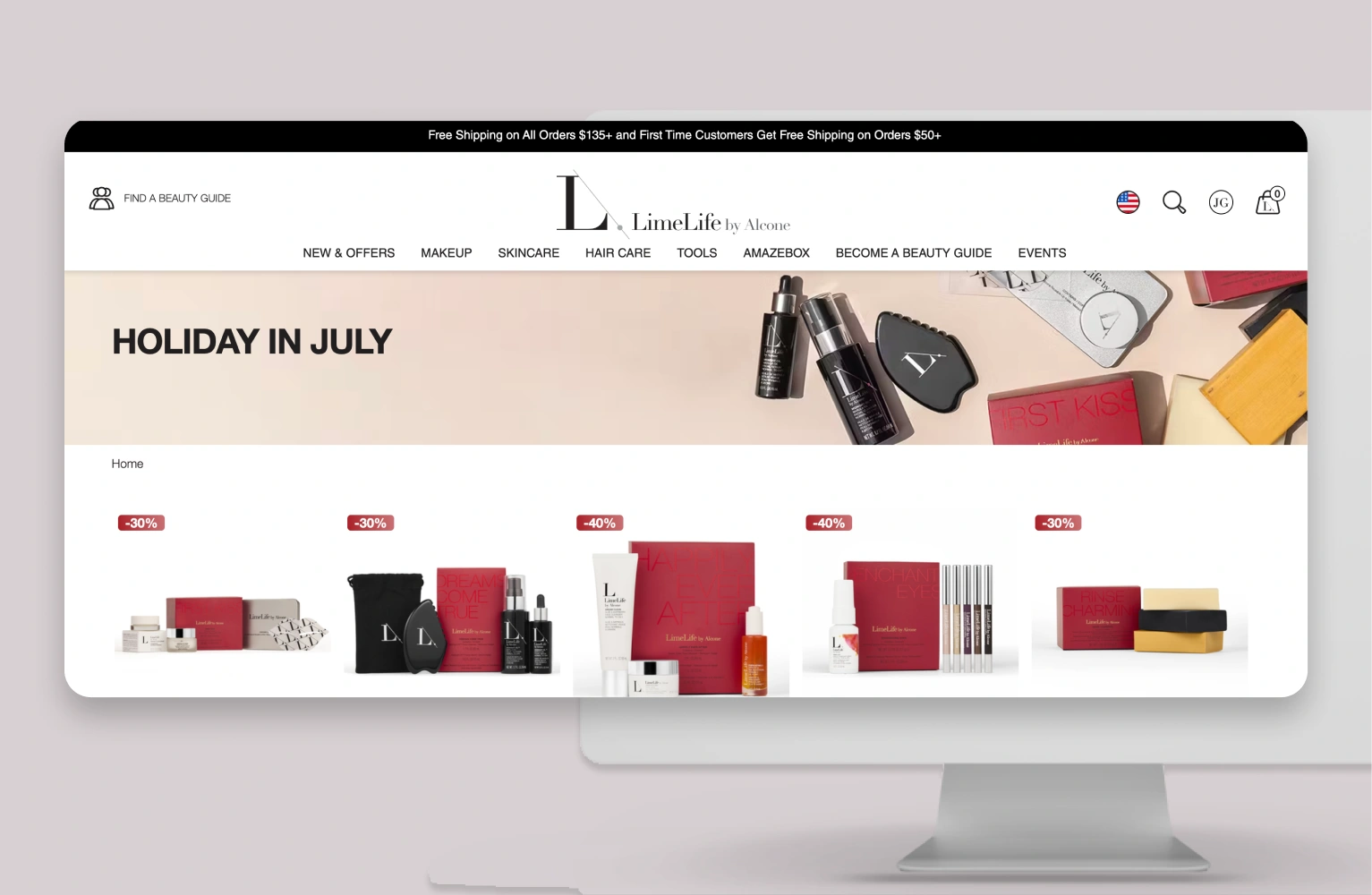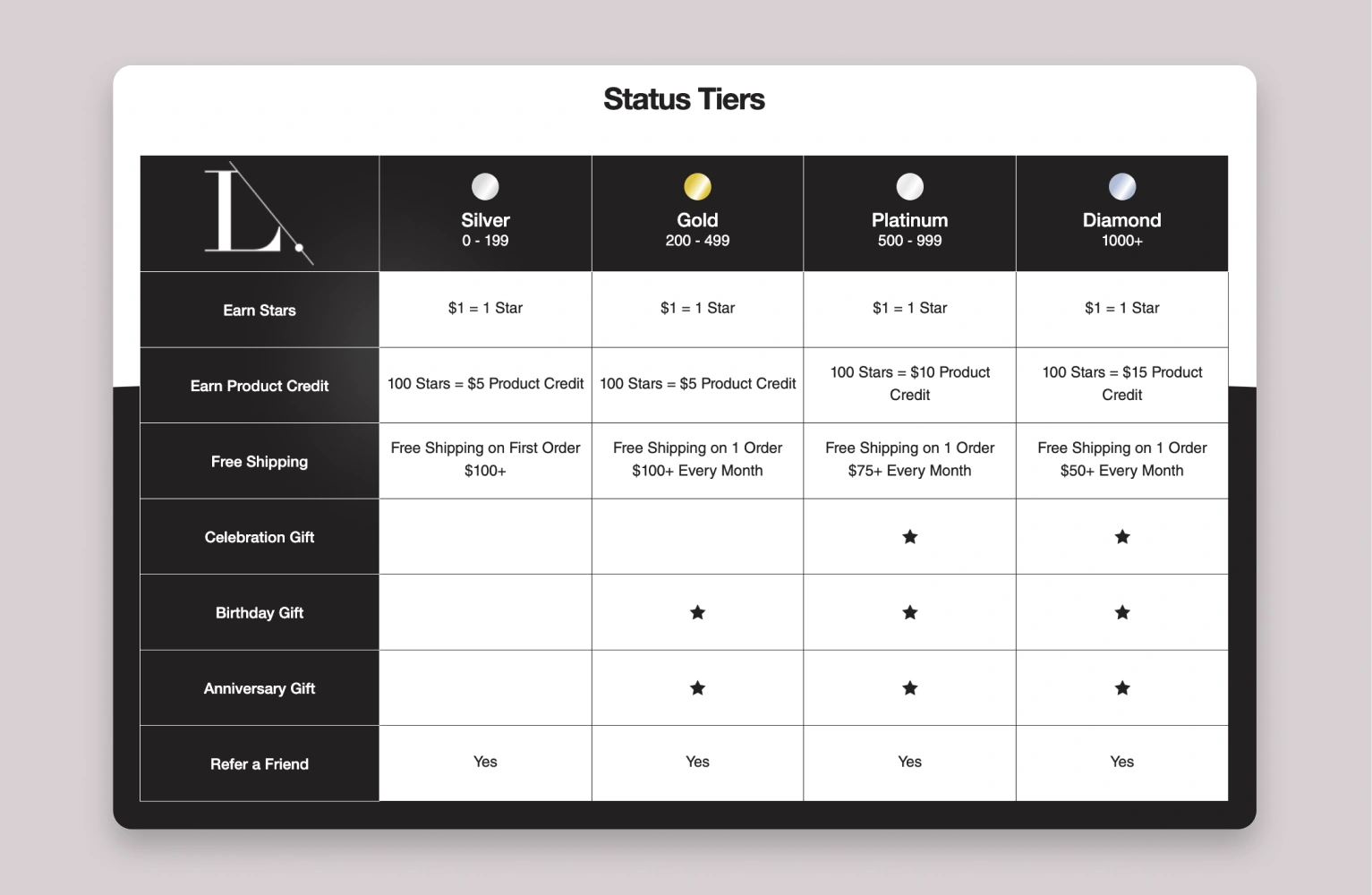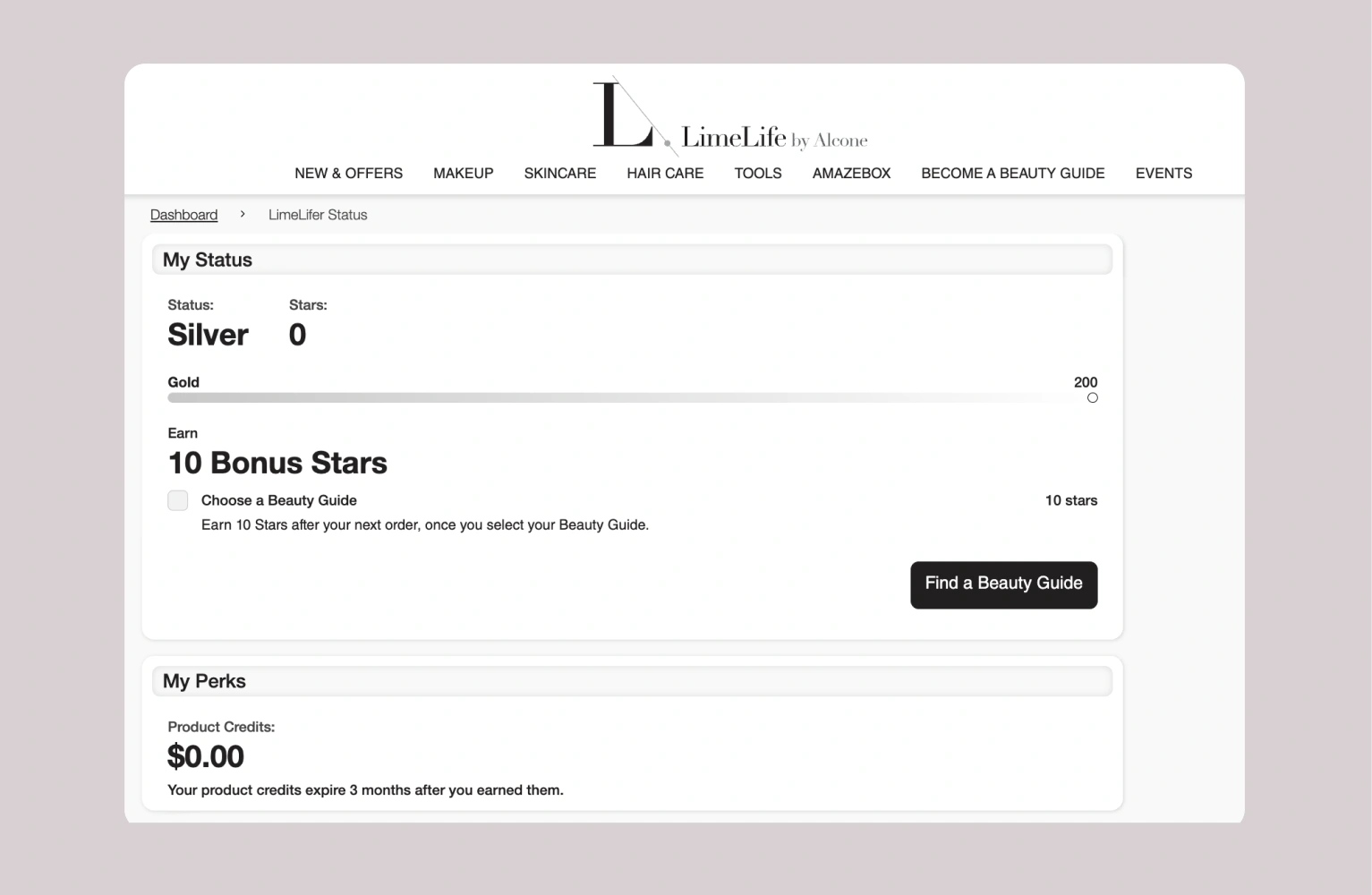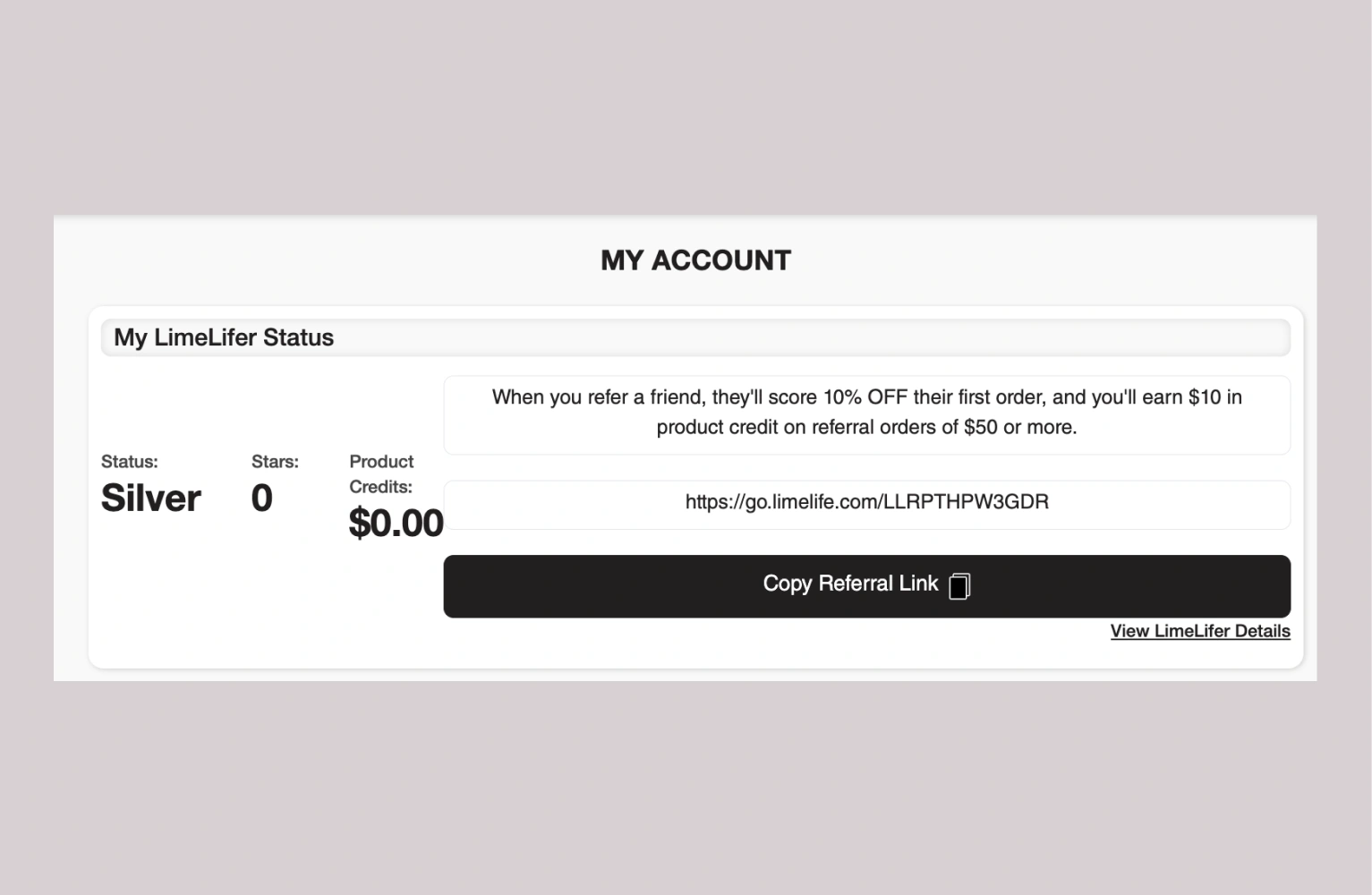LimeLife by Alcone, owned by the L’Occitane Group, began in 1952 as Alcone, a supplier of professional makeup for the entertainment industry. Today, the brand combines a direct sales model – driven by independent Beauty Guides who sell through personal networks and earn commissions – with a growing retail channel. To support this retail expansion, LimeLife uses Voucherify to manage and scale personalized promotions, coupons, referrals, and a loyalty program tailored to the needs of retail shoppers.
Key challenges
- Enabling dynamic segmentation to power diverse, data-driven promotions that hit the right audience every time.
- Migrating promo data from their existing platform without disrupting ongoing campaigns.
- Shifting promotions ownership from devs to marketers, reducing engineering workload.
LimeLife by Alcone had long wanted to implement dynamic promotions, but their in-house tech stack made it difficult. Every campaign had to go through devs, slowing down execution.
Voucherify changed that. With metadata and advanced promotion logic, LimeLife can now launch promotions without bottlenecks. What once took weeks can now be handled directly by marketing, cutting time-to-market by 70% and enabling fast promotion testing.

The team can now schedule campaigns ahead of time and use templates to launch faster. What used to take a full dev team is now handled smoothly by just four people, from setup to go-live.
How LimeLife powers promotions at scale
Voucherify lets LimeLife create segmented offers, and quickly build, adjust, and test them at scale. Some examples of these include:
- Automatic promotions:
- Free gifts with purchase for orders over a minimum limit.
- BOGO & bundles on items like lip glosses.
- Free shipping perks for members, varying based on tier.
- Daily holiday mystery gifts for orders over a minimum limit.
- Coupons:
- Flash event codes that can be used for shipping or % off discounts.
- New customer opt-in codes giving % off discounts.
- Birthday coupons & anniversary gifts.
These offers are governed by flexible validation rules, like order minimums, subscription status, product exclusions, segments, and per-customer limits. Segmentation is dynamic and metadata-driven, using attributes such as order count, partner employee flags, market, and role.
LimeLife runs loyalty and promotions across four currency regions – USD, CAD, EUR, and GBP.
The US project alone has launched 180+ campaigns, with 26 currently active. Through these they have generated nearly 1,700,000 codes and have completed 350,000+ redemptions bringing in $46.9M in sales.
LimeLife uses product metadata to power dynamic product collections, filtering by attributes like category, and to build custom static collections for specific promos. With over 1,300 SKUs imported, they can easily run gift with purchase campaigns and set SKU-level exclusions to fine-tune eligibility for each offer.
LimeLife’s checkout process integrates Voucherify APIs at multiple stages:
- Retrieve eligible promotions – they first call the Qualification API to fetch all promotions available for the customer's context.
- Custom selection logic – a custom engine determines which promotions to apply. This includes default selections, user overrides, voucher additions, and exclusions.
- Validate & lock promotions – after selection, the Validation API is used to lock and validate redeemables before finalizing them for checkout.
- Final redemption – at purchase confirmation, LimeLife re-validates the promotions and, if unchanged, calls the Redemption API to redeem the promotion and apply loyalty logic such as star accumulation.
How the LimeLifer program turns spending into status
Before Voucherify, LimeLife already had a loyalty program. To ensure a disruption-free experience for customers, the Voucherify team supported a migration of loyalty data. LimeLife imported their entire customer base and generated loyalty cards for each user, while Voucherify handled the import of loyalty points based on historical records. The migration was completed in a single day.
Within the program, customers earn stars for every $1 spent, which accumulate throughout the year. These stars are used to earn product credits, which customers can use on purchases. Product credits are managed through a secondary loyalty program tied directly to the member’s tier. With over 100 distinct star tiers, LimeLife uses segments to track each tier and grant rewards accordingly. These segments also drive over 100 earning rules to ensure that product credits are accurately distributed based on a customer’s position in the primary loyalty program.
The program features 4 tiers – Silver, Gold, Platinum, and Diamond – where members unlock new benefits and perks as they collect more stars. Rewards for higher tiers include special gifts for birthdays or anniversaries, along with different amounts of product credits.

Once a customer collects 100 stars, they can redeem product credit vouchers on purchases of $25 or more. The loyalty program already has attracted 85 000+ members with a total accumulation of over 20 million points.
Each member has access to a personal loyalty wallet where they can track their status – tier, stars collected, and product credits earned. They can also see new and more engaging ways to earn points such as finding a dedicated Beauty Guide for 10 extra stars.
Here’s how LimeLife uses Voucherify APIs to enrich the member experience:
- Display loyalty balances and status – the Qualification API provides loyalty card info including stars, product credits, tier, and join date.
- Track points expiration – for product credits, they fetch expiration details via the Points Expiration API based on the associated loyalty card ID.
- Show loyalty tiers – the Loyalty Tiers API is used to display tier information, enabling customers to see their current rank and progress toward the next level.
To optimize performance, the API calls are only triggered when necessary, such as on initial load or after customer actions that require data refresh.

How loyalty meets advocacy in LimeLife’s referral program
LimeLife has added a "Refer a Friend" feature to their loyalty program where members can refer friends and family to try out the brand.
When a member refers a friend, the new customer receives 10% off their first order, while the referrer earns $10 in product credit for each referral order of $50 or more. The incentivized word of mouth has already attracted over 1500 new customers to try out LimeLife.

How LimeLife connects Voucherify with Exigo and Insider
LimeLife’s direct sales platform, Exigo, is closely tied to their web operations, handling all in-house payments and ordering. While the structure is being modified to segment some functions out of Exigo, promotions were previously limited by the platform’s constraints. It only offered a basic discount module, lacking flexibility for personalized promotions, messaging, and code distribution. With Voucherify, LimeLife gained the ability to fully customize their promotions, tailoring them to specific needs.
Voucherify and Insider work hand-in-hand to power LimeLife’s abandoned cart and re-engagement campaigns. Using Insider’s automation workflows, LimeLife can trigger personalized messages, such as reminders or win-back offers, at the right time. As part of these workflows, Insider dynamically calls Voucherify APIs to fetch relevant incentives, like referral codes or unique coupon codes, ensuring each message is tailored and conversion-driven without manual intervention.
How LimeLife creates commission-based incentives for Host rewards
Next on the list, LimeLife is continuing to use Voucherify to dynamically incentivize Party Hosts for sales made from parties.
Voucherify will be used to track Host parties, and grant rewards to Hosts based on the cumulative sales from these parties in a specified timeframe, all while ensuring no impact on regular loyalty program stars and product credit earnings.
Voucherify allows LimeLife to create multiple different types of Host incentives including % off, free items, and free shipping, with the rewards varying using dynamic discounts based on tiered results of the party sales.













.svg)
